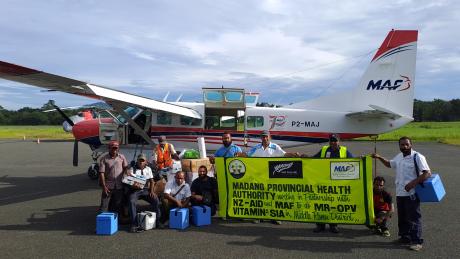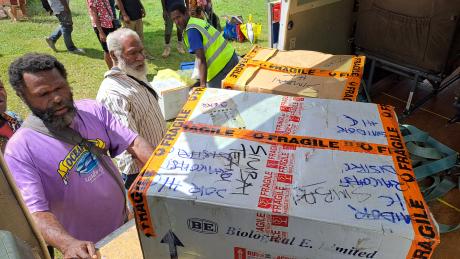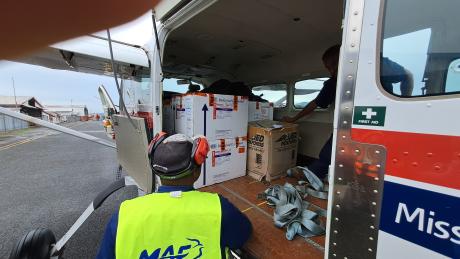
The Madang Provincial Health Authorities (PHA) were super excited as they sent off more health officers to remote places rolling out the government's MRSIA campaign.
The team came to our Madang base with a banner to thank all the involved partners for their engagement in this campaign.
There is no accessible road and the only hope is that we have an airstrip.
Health Patrol teams from the Madang PHA have been flown to Sengapi and Dusin (24 May), and to Yomneki, Simbai and Mamusi (23 May), carrying out this immunisation campaign in these hard to reach communities of their province.

Nursing Officer Isaac Kauka, and Officer in Charge of the Sengapi Health Centre, explained the scope of the campaign and its dependency on MAF to reach the isolated communities.
"Our agents carry out the vaccine program at the remote places. We will vaccinate the children under five years around Sengapi, also going to Dusin and to Gebrau, to all surrounding communities. There is no accessible road and the only hope is that we have an airstrip around Sengapi, Dusin and Gebrau and therefore we travel on MAF plane."
To walk from Sengapi to Dusin would take them seven to eight hours, Isaac shared. But with MAF, the PHA agents were dropped there after a ten minute flight. What a difference it makes for the people to travel via MAF, especially when carrying critically cargo like vaccines which need to be cooled and used within a certain time frame.
The week before, our aircraft flew three charters from Port Moresby to Madang, Telefomin and Mt Hagen, funded through New Zealand Aid to assist with some last minute emergency distribution runs. The big vaccine cool boxes were handed over to the respective Provincial Health Authorities for Madang, West Sepik and Southern Highlands at our receiving MAF bases.
MAF is pleased to be supporting this vaccination campaign of the PNG government, as it clearly shows that our work is in response to local demand and being used to deliver local priorities. Thank you, New Zealand High Commission, Port Moresby, Papua New Guinea, for sponsoring these flights and partnering with us to improve the health of the people living in remote communities.
Story by Mandy Glass
